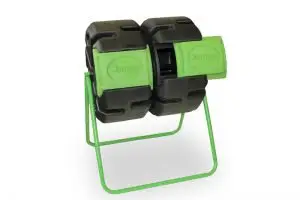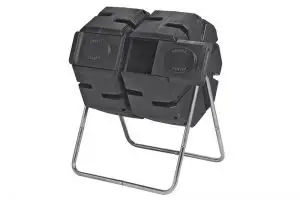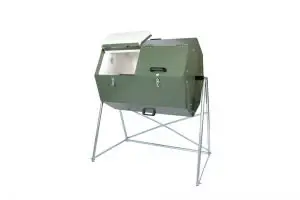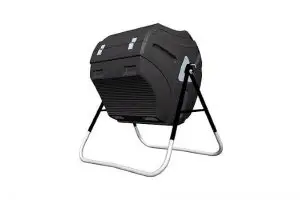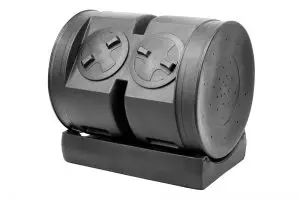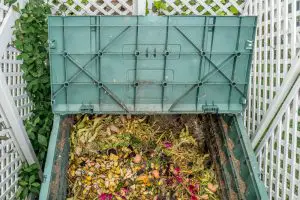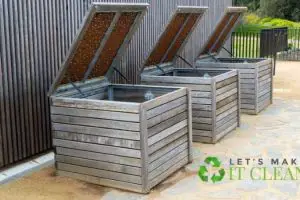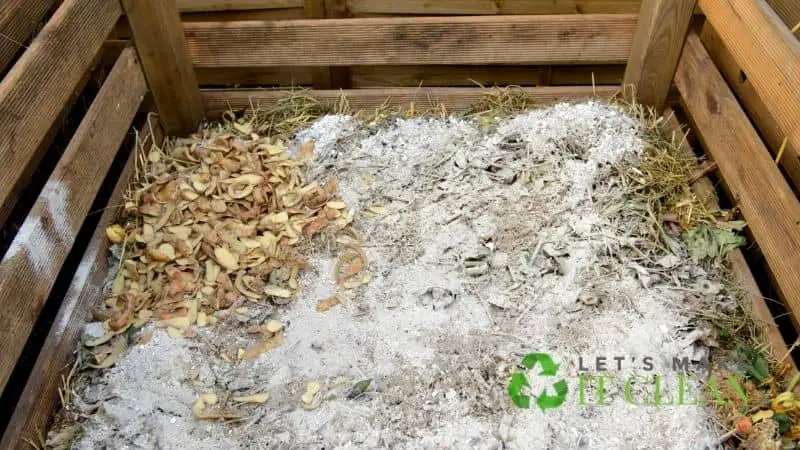To stop the compost smell, make use of a compost bin that has charcoal filters which you will clean regularly. You should also use compostable garbage bags and add brown materials to your compost piles.

Kitchen compost is efficient in improving the quality and productivity of your soil. However, at times you will get unpleasant smells from it.
Quick Navigation
The smell makes your living conditions challenging. Cooking in the same kitchen is bound to get uncomfortable. You will, therefore, need to figure out a way to stop the smell.
This article has more insight into stopping your kitchen compost bin from smelling.
How Do I Stop My Kitchen Compost From Smelling?
Most of the compost materials used in a compost bin are green waste. Whenever you add the green waste in excess to your compost bin, it begins to get an ammonia stench.
Similarly, you may get a sewage stench from the compost bin if you use excess green waste scraps. Eliminating this problem requires you to balance your brown waste and green waste materials input from your garbage cans.
Be proactive in stopping this smell by employing the following tactics:
Use a Compost Bin With Charcoal Filters
If you plan on placing your compost bin on a countertop, it will help if you get one with charcoal filters. The advantage of using this type of compost bin is the ease of its use.
With the removable liner, you can comfortably wash using a dishwasher without causing any damage. Additionally, the compost bin has a space allocated for the charcoal filter, meaning you will not struggle with creating room for charcoal.
Once you have cleaned the bin’s liner, you eliminate food scraps getting trapped when they hit a tight corner. Waste materials in tight corners begin to produce horrible smells when the decomposing process begins.
When you use these compost bins equipped with a charcoal filter, you reduce the possibility of the foul odor escaping into your cooking space. This is because the filters sieve the odor neutralizing it.
Regular Filter Replacement
The charcoal filters in your compost are prone to wear and tear after prolonged use. For this reason, you need to replace them after every four to six months of continuous use.
The filters don’t need to be ineffective to replace.
Add Brown Material to the Compost Pile
Having only green material in your compost bin results in having smelly compost. To stop that awful smell, make sure you add brown materials from a nitrogen-rich source such as newspaper. You can also shred toilet paper and lay the materials at the bottom of your compost pile.
You might like: Top 8 Best Composting Toilets
Another alternative source for nitrogen is grass clippings from your yard. These materials will maintain acceptable moisture levels. Excess moisture in the compost pile often facilitates mold growth, which will smell like sewage.
Use Compostable Garbage Bags
Homeowners who use garbage bags that can be composed with the and food waste get fewer smells from their composters. The compostable bags will eliminate the need to clean a bag after use.
On some occasions, you may fail to clean the paper bags resulting in some food scraps being left behind. When these materials decay, they produce a terrible smell.
Another option you should explore is using a 5-gallon container that has a lid. The container should be made of plastic for easier cleaning.
Dry the Compost Bin’s Liner
Cleaning your compost bin’s liner helps reduce the smell. However, if you use it while it’s still wet, you amplify the bad smells. For this reason, you must make sure the liner has completely dried before using it.
The liner’s wetness creates an environment that mold thrives in. On top of that, you will have mildew in your compost bin, which will eventually stink. To solve the smelly compost bin problem, ensure you allow the liner to dry naturally in the sun.
Can Compost Bins Smell?
A compost bin that is poorly maintained will have bad smells. Whenever you use the appropriate brown waste and green waste ratio, you facilitate proper decomposition—on the contrary, adding only green materials imbalances the compost heap resulting in unwanted odors.
The desirable smell from a compost bin is that of dirt. Getting any other smell suggests that your compost is not decomposing in the right manner. There is either excess or less heat as a result of the compost heap ingredients.
When suppressing the smell, you add a layer of dry leaves or straw to the compost pile.
Where Should I Put My Compost Bin in My Kitchen?
Making compost in this space may seem tricky if you don’t know where to place the bin. If you expose it to direct sunlight, you increase the temperature to an unwanted level. On the other hand, if the compost bin is placed in a too cold spot, the decomposing process will be slow.
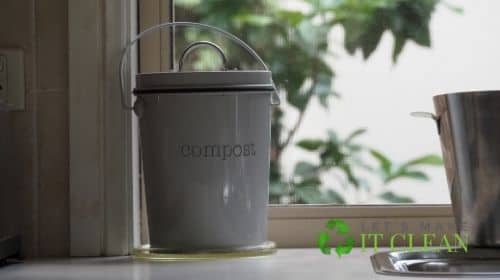
Use any of these strategic locations to put your compost bin:
Under Your Kitchen Sink
Some homeowners are not comfortable with the compost bin being visible. If you are one of these people, you can position the bin under your sink. Space will look neat without the composter on sight.
It would be best to allocate one cabinet under the sink for composting. If you have a small space, hang your utensils on the wall to create space for the bin under the sink. Alternatively, you can place the tools on shelves that composters cannot fit in.
Under a Plant Stand
The space under plant stands is often underutilized. Take advantage of this space and put your compost bin under the plant stand. You will be adding aesthetic value to your space and composting simultaneously.
Optionally, repurpose some furniture such as stools and use their under space storage for your bin.
On the Kitchen Counter
Compost bins that have been adequately maintained can be placed on a counter. This, however, applies if you have enough working space. Otherwise, you will limit your working area, causing uncalled for discomfort.
Whenever you decide to go with the countertop option, add a little glamor to your house by painting the bin. Beautifully painted compost bins on the counter can also be used as mounting space for recipes and reminders.
What Should Compost Smell Like?
A compost pile that is actively composting should have a smell like that of earth dirt. Observing any other smells is a sign of inappropriate decomposition. Even with the addition of scraps and banana peels that stink when decomposing, the smell should not change.
A change in the dirt smell of your compost is caused by excess moisture in your compost bin. Overuse of green materials too can cause stinky odors. For this reason, it is crucial to allow proper air circulation by covering the pile with browns that reduces the excess moisture.
Whenever you add meat and dairy products to your indoor composter, you will get an unpleasant smell. The odor from the bin will be rotten due to the microorganisms’ activity in the compost bin.
What Material Do I Use for My Indoor Compost Bin?
There are three crucial ingredients for an indoor compost bin: browns, green materials, and water.
The brown ingredients are a carbon-rich source for your indoor composters. The branches you get from your garden, and twigs should be cut into manageable pieces. Add them to the composting system to create an ingredient balance.
Green materials such as vegetable scraps, apple cores, coffee grounds, and tea bags are nitrogen-rich sources for the compost bin.
Once you have balanced that ratio, now adds water to your bin. The water will ensure the bin’s content isn’t too dry for decomposing.
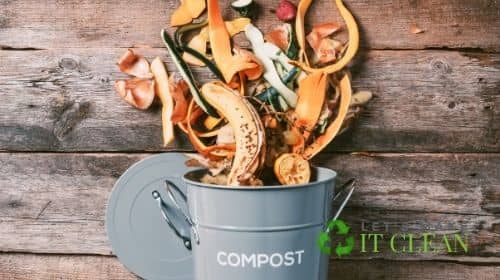
The materials that you can use in these bins without worrying about the smell include:
- Vegetable waste
- Fruits scraps
- Tea leaves
- Coffee filters
- Coffee grounds
- Eggshells
- Waste paper such as used shopping lists
- Pieces of cardboard from constructions
- Grass clippings from your garden
- Dirty cotton towels and rags
Be warned that if you don’t cut the above materials into small pieces, you will; slow down the composting process.
On the other hand, there is waste from your home that you should never add to your composting bin. These materials include:
- Leaves from walnut trees. They produce a substance that, when added to your soil, will be toxic to some plants
- Charcoal. When you use charcoal, you risk killing plants with the harmful byproducts of its decomposition.
- Animal Products such as milk of any kind, meat, or eggs. The use of these animal products results in rodent and insect infestation. On top of that, the products decay to produce a horrible odor that might be almost intolerable.
- Waste from your pets. Cats and dogs consume a wide range of foods that sometimes have bacteria harmful to human beings. Similarly, the waste may have disease-causing pathogens dangerous to people.
- Cooking oil waste. The oil will attract termites.
Conclusion
The smells in your composting bin are a result of ill-suited decomposition. Ensure you use the recommended materials for composting to avoid getting bad smells. It will also help if you place the composter in a location that allows partial exposure to the sun.
With the information from this article, you should be able to stop the undesired smells from your compost bins.

